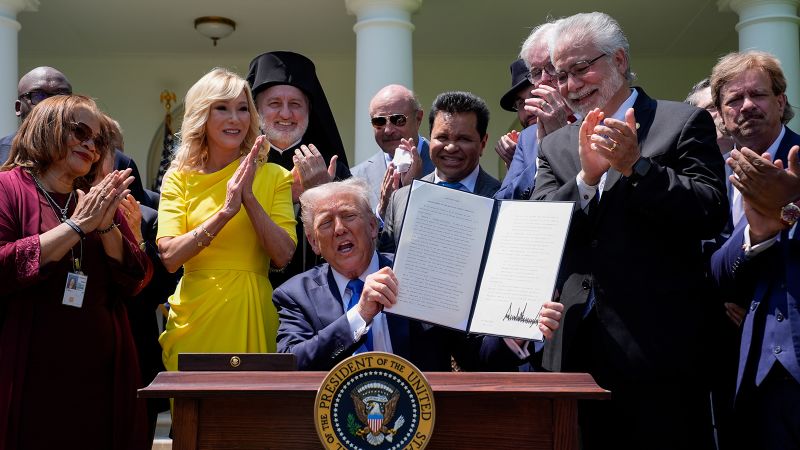CNN
—
President Donald Trump signed an executive order Thursday directing the Corporation for Public Broadcasting to end federal funding for America’s two biggest public broadcasters, which have faced a series of attacks from the White House and Republican lawmakers accusing them of biased reporting.
The order instructs the CPB’s board to terminate direct funding for National Public Radio and the Public Broadcasting Service to the “maximum extent allowed by law and shall decline to provide future funding.” It also orders the board to take steps to “minimize or eliminate” indirect funding to NPR and PBS.
The corporation, however, is a private entity that is supposed to be protected from government interference, including executive orders from the president. The corporation is currently suing Trump because the White House tried to terminate three of its board members earlier this week.
“CPB is not a federal executive agency subject to the President’s authority,” the corporation’s CEO, Patricia Harrison, said in a statement. “Congress directly authorized and funded CPB to be a private nonprofit corporation wholly independent of the federal government.”
“The President’s blatantly unlawful Executive Order, issued in the middle of the night, threatens our ability to serve the American public with educational programming, as we have for the past 50-plus years,” PBS CEO Paula Kerger said in a statement Friday morning. “We are currently exploring all options to allow PBS to continue to serve our member stations and all Americans.”
Each year, the CPB disperses $535 million in taxpayer funds to public radio and TV stations nationwide and to producers of educational and cultural programming.
Stations, in turn, provide free and universal access to news, emergency alerts and a wide array of programming.
In Trump’s first term, his annual budget proposals zeroed out the funding for the corporation, but Congress always allocated the funds anyway – a reflection of the fact that national Republican opposition to NPR and PBS is countered by local support.
In Trump’s second term, he is being much more aggressive about trying to shut down the public broadcasters. The White House is alleging that the networks “spread radical, woke propaganda disguised as ‘news.’”
PBS and NPR executives reject that, but they recognize that Trump feels emboldened to pursue their federal funding.
The White House has said it will soon ask Congress to claw back the money already allocated for the corporation over the next two years.
“These are funds that we were already counting on,” PBS CEO Paula Kerger said earlier this week, “because it’s already appropriated. So we’re anxious to see what they’re talking about and we will be responding very quickly.”
House speaker Mike Johnson said of the expected rescission proposal, “I don’t know what the final outcome is going to be, but I can tell there’s a lot of thoughtful debate about it.”
Trump’s executive order is another pursuit of the same goal – a zeroing out of federal funding for public media.
The order also directs Health and Human Services Secretary Robert F. Kennedy Jr. to investigate NPR and PBS for possible employment discrimination, and it instructs the heads of all other federal agencies to “identify and terminate” any direct or indirect funding of the media organizations.
When Congress established the corporation in 1967, it specifically tried to insulate public media from political pressure.
The law said the corporation is a private entity, not a federal agency, “to afford maximum protection from extraneous interference and control.”
The legislation expressly forbids the government from exercising “any direction, supervision, or control over educational television or radio broadcasting.”
But Congress could choose to stop funding the corporation. In that case, bigger stations with lots of donors and other sources of revenue would survive, but smaller stations could be forced off the air, especially in rural areas that are Republican strongholds.
In many cases “these are the last locally owned broadcasters in these communities,” Ed Ulman, the CEO of Alaska Public Media, told CNN last month.

